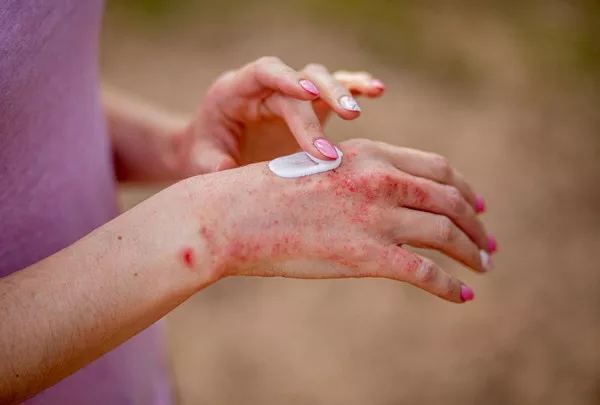Eczema, also known as atopic dermatitis, is a chronic skin condition that causes the skin to become inflamed, itchy, and red. It can be particularly troublesome at night when the itching seems to intensify, leading to disrupted sleep and further skin damage. Understanding how to manage nighttime itching can significantly improve your quality of life and help prevent exacerbation of eczema symptoms. This article provides comprehensive strategies to help you stop scratching your eczema at night.
Understanding the Causes of Nighttime Itching
1. Why Eczema Itches More at Night
Eczema itching tends to worsen at night due to a combination of physiological and environmental factors. One reason is that the body’s natural corticosteroid levels, which help control inflammation, decrease at night. Additionally, the skin tends to lose more moisture during the night, leading to dryness and increased itchiness. Finally, external factors such as warmth and sweating can exacerbate itching.
2. The Impact of the Itch-Scratch Cycle
The itch-scratch cycle is a significant factor in eczema management. Scratching provides temporary relief but ultimately leads to more itching and damage to the skin barrier. This cycle can be particularly vicious at night, making it crucial to find effective strategies to break it.
Strategies to Stop Scratching at Night
3. Establishing a Nighttime Skincare Routine
A consistent nighttime skincare routine is essential for managing eczema. Here are some key steps:
Moisturizing
Use a thick, fragrance-free moisturizer or emollient before bed. Look for products containing ingredients like ceramides, which help restore the skin barrier, and avoid those with potential irritants.
Medicated Creams and Ointments
If prescribed by your dermatologist, apply corticosteroid creams or other medicated treatments to affected areas. These can help reduce inflammation and itching.
Wet Wrap Therapy
For severe eczema, wet wrap therapy can be highly effective. After applying moisturizer and any prescribed medication, cover the area with a damp layer of gauze or cloth, followed by a dry layer. This method helps increase the absorption of topical treatments and maintains skin hydration.
4. Creating a Comfortable Sleep Environment
Optimal Room Temperature
Keep your bedroom cool, as warmth can exacerbate itching. The ideal temperature is around 60-67°F (15-19°C).
Humidifiers
Using a humidifier can add moisture to the air, preventing your skin from drying out during the night.
Bedding Choices
Choose soft, breathable, and hypoallergenic bedding materials such as cotton. Avoid synthetic fabrics that can irritate the skin.
5. Behavioral and Lifestyle Modifications
Cut Your Nails Short
Keeping your nails trimmed short can minimize damage if you scratch in your sleep.
Wear Soft, Cotton Gloves
Wearing gloves can prevent you from scratching your skin directly, reducing the risk of further irritation.
Mindfulness and Relaxation Techniques
Stress can exacerbate eczema symptoms. Practices such as meditation, deep breathing exercises, and yoga can help reduce stress levels and improve sleep quality.
6. Dietary and Hydration Considerations
Anti-Inflammatory Diet
Incorporate anti-inflammatory foods into your diet, such as fatty fish, fruits, vegetables, and nuts. Avoid potential triggers like dairy, gluten, and processed foods if they worsen your symptoms.
Stay Hydrated
Drink plenty of water throughout the day to keep your skin hydrated from the inside out.
7. Over-the-Counter and Prescription Treatments
Antihistamines
Non-drowsy antihistamines can help reduce itching during the day, while sedating antihistamines may be beneficial at night to help you sleep.
Prescription Medications
If over-the-counter treatments are not effective, consult your dermatologist about prescription options such as immunomodulators or systemic medications.
8. Alternative Therapies
Phototherapy
Phototherapy, or light therapy, can help reduce inflammation and itching. It involves exposing the skin to controlled amounts of natural or artificial light.
Acupuncture and Acupressure
Some individuals find relief from eczema symptoms through acupuncture or acupressure, which can help reduce stress and promote relaxation.
Long-Term Eczema Management
9. Identifying and Avoiding Triggers
Keep a diary to track potential triggers such as certain foods, fabrics, or environmental factors. Avoiding these triggers can help manage your eczema.
SEE ALSO: What to Put in Bath Water for Eczema
10. Regular Dermatologist Visits
Regular check-ups with your dermatologist are essential for monitoring your condition and adjusting treatments as necessary.
11. Education and Support
Joining support groups or forums for individuals with eczema can provide emotional support and practical advice. Education about the condition is crucial for effective management.
Conclusion
Managing eczema and preventing nighttime scratching requires a multi-faceted approach, combining skincare, environmental modifications, behavioral changes, and medical treatments. By understanding the underlying causes of nighttime itching and implementing these strategies, you can significantly reduce the impact of eczema on your sleep and overall well-being. Always consult with your healthcare provider to tailor these recommendations to your specific needs and to explore additional treatment options.
Related Topics:


























